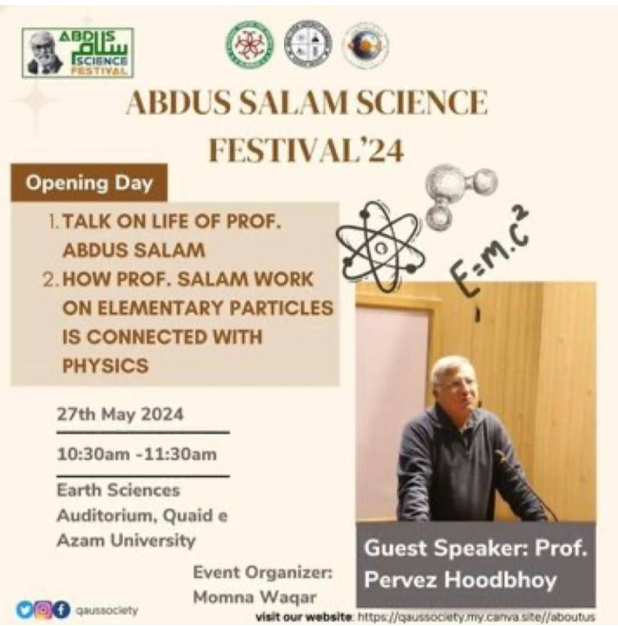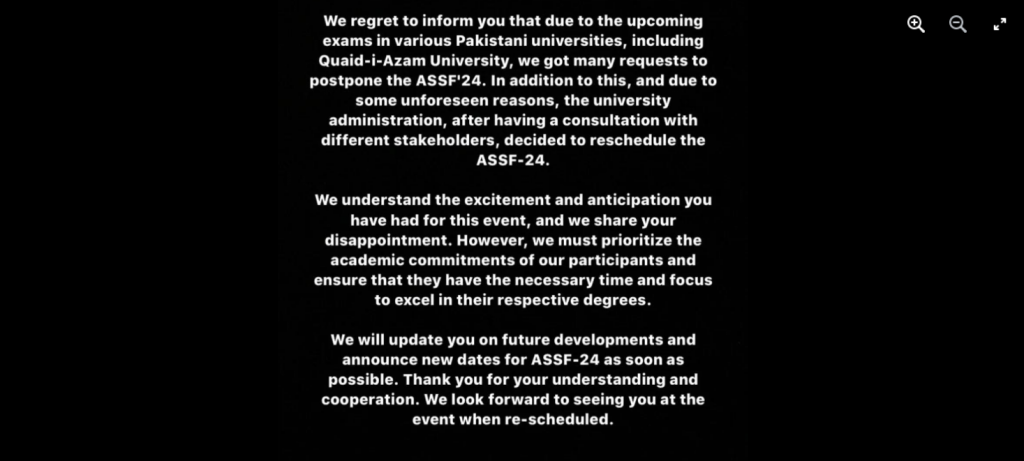Extremist groups had threatened to stage a sit-in outside the varsity unless the festival was not cancelled or its name was changed

An impending science fair scheduled to be held later this month at the top-ranked varsity of the country, Quaid-i-Azam University, has been rescheduled after pressure from extremist religious groups.
The Abdus Salam Science Festival was scheduled to be held at the Earth Sciences Auditorium of the Quaid-i-Azam University (QAU) from May 27-29. It had been organised by the student-run QAU Science Society and was due to be headlined by prominent physicist Dr Pervez Hoodbhoy.

In a short video message, Dr Hoodbhoy said that Dr Abdus Salam is one of the few scientists from Pakistan that the world knows about and who won a Nobel Prize in Physics. In the video, he invited students to attend the festival to learn about Dr Abdus Salam, the scientist.
The organisers had planned several events, talks and workshops as part of the festival, including a talk by Dr Hoodbhoy on Dr Abdus Salam’s work on elementary particles and physics, a talk on mind motivation, a workshop on balancing careers and relationships, a science quiz competition, a poster competition, a science model exhibition, a photography competition, a science fiction story-writing competition, a science-based scavenger hunt, and other activities.
“The organisers asked me to give the keynote lecture on Dr Salam’s physics achievements followed by another technically focussed one,” Dr Hoodbhoy told The Friday Times.
But on Friday, the society posted a message that the event had been rescheduled. They provided no date for the rescheduled event.
The organisers explained the reason for rescheduling the event as: “Due to upcoming exams in various Pakistani universities, including Quaid-i-Azam University, we got many requests to postpone the ASSF-24.”
“In addition to this, and due to some unforeseen reasons, the university administration, after having a consultation with different stakeholders, decided to reschedule the ASSF-24.”
The organisers added that they must prioritise the academic commitments of its participants and ensure that they have the necessary time and focus to excel in their respective degrees.

However, the event was postponed after threatening and vitriolic videos and messages were posted by religious extremists. In particular, a video was doing the rounds on social media by an individual identified as Hasan Rana, who operates a YouTube Channel called “KTV” — the vitriolic media arm of the International Majlis Tahhafuz-e-Khatm-e-Nabuwat and Khatm-e-Nabuwat TV (KTV) — “which focuses on Khatam-e-Nabuwat, who proceeded to use the science and student-oriented event to accuse the varsity of “facilitating Quadianis” in Pakistan. He also accused Dr Abdus Salam, a theoretical physicist who helped lay the foundations of Pakistan’s nuclear and space programmes, of being an extremist.
He proceeded to threaten the varsity that if it allowed the event to go ahead, he would mobilise religious and political groups and stage a protest sit-in outside the varsity.
Representatives of International Majlis Tahhafuz-e-Khatm-e-Nabuwat and Khatm-e-Nabuwat TV met with Quaid-i-Azam University Vice Chancellor in his office to convince him against hosting of the event.
There was no direct statement or stance from the university.
The Ahmadi community said in a statement that if this story is true, it is extremely disturbing to know that a festival to be held under the name of the first Pakistani Nobel Laureate Scientist Dr Abdul Salaam is being cancelled or postponed due to pressure from the Khatm-e-Nabuwat organisation.
Meanwhile, Dr Hoodbhoy told The Friday Times that maybe there is even more to what happened than meets the eye..
It is pertinent to mention here that the Ahmadiyya Community, of which Dr Abdus Salam was a part, has faced growing persecution in recent years at the hands of those adhering to various shades of the Khatam-e-Nabuwat movement.
The original post can be read HERE.
